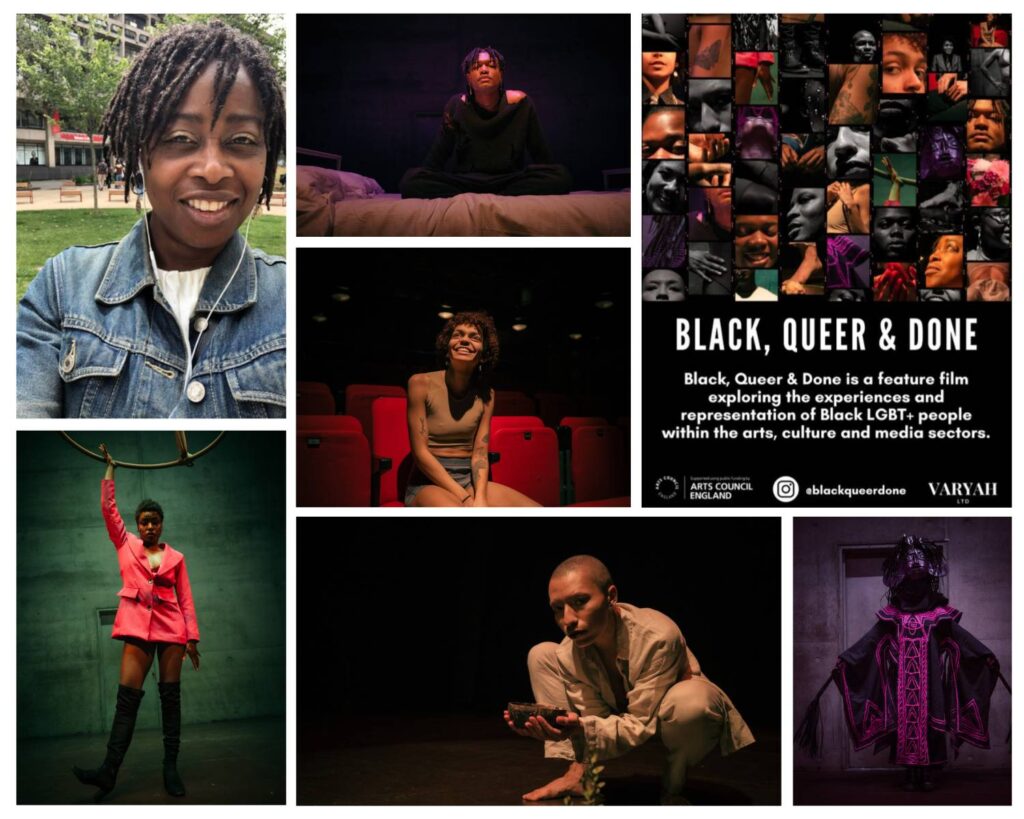Nyasha Daley
Director of
Black, Queer & Done
A complete interview with Nyasha
We would like to express our sincere gratitude to director Nyasha for taking the time to answer our questions.
Whole team of Liverpool Indie Awards is wishing you the very best in all your future projects. We hope to see more of your exceptional work in the years to come. Thank you once again!
Black, Queer & Done is a feature length documentary exploring the experience of Black Queer artists and arts professionals within the UK and wider mainstream arts, media and culture sector.
I wanted to give space to the participants of our focus groups, interwoven with Black, queer artistic expressions. Our delegates, who were from the UK, US and Africa were very candid as we explored themes through interviews and focus groups; these commentaries were then interspersed with eight artistic expressions from diverse performers, including actors, circus artistes, dancers and poets. It was a lengthy and intensive editing process, made all the more tricky as we had limited shots to work with. We hope we did justice to both the voices and artistic outputs shared by our cast.
We had a very limited budget to work wth and I keptmy crew tight. There were four of us, with three of us (including myself) taking on multiple roles in order to keep costs to a minimum. I worked with professionals that I’d worked with before, so I had the reassurance that we would be able to work quickly, efficiently and productively together. Al of my crew work to very high standards of professionalism, creativity and care. They also have great senses of humour (which helped when we had long nights and no budget left too!).
I think our biggest challenge was that none of us had ever produced a feature film before, so there was a lot of learning on the job. We watched hours and hours of YouTube and did a lot of trouble shooting in the moment. I’d never used Premiere Pro prior to the production of BQD, however, in order to expedite production, I had to learn quickly in order to chop and rearrange focus group interviews into a flow that my Director of Photography could work with. It was the steepest of learning curves, but I loved every minute of it (I think my crew enjoyed it too!).
Getting the film in the can! We had so many obstacles from global lockdowns, social distancing, limited knowledge, resource and budget and (sadly) a huge lack of support from the mainstream Coventry ‘LGBT+ Community’. At times, it was very disheartening. However, we did it. We had a vision and a story to tell and we produced a debut that we’re very proud of.
We would have definitely asked the Arts Council for a bigger budget, if we’d known just how intensive editing can be and the drain it would be on our budget. It would have also been nice if we’d been able to pay all of our contributors more; they were so generous with their time, energy and opinion. Filming during lockdowns meant we weren’t able to play around with visual storytelling, which was a shame. We did our best with the shots captured, however, I’d have liked to have been able to shoot the artists over a longer time frame than we could afford as well.
Prior to producing BQD, my team and I produced an online festival celebrating Black artistry and culture, called iDENT. This was produced early on in the global lockdowns and was an open call for Black artists to send in either existing or new five minute pieces to form the festival. The work speaks for itself in terms of the high quality of work shared with us; I am also proud that we were able to secure funding to pay artists during a time of huge global instability.
Do it! Read, research, review and reflect. But just do it. Don’t let anyone tell you that you should do it one way or another. Be open to wisdom but don’t let the status quo create inertia. Grab a camera phone, a old video camera or a high tech bit of kit and start to play with story, form and image. Dream about it, think about it, apply for funding for it. And. Just. Do. It.
Our contributors and performers were considerate, forgiving, passionate and professional; we’re very grateful that we were able to capture and share their voices.
Our Sound Engineer is also a Music Producer, which is super handy, right? He is also our co-Executive Producer and my husband too! I very much deferred to his expertise when it comes to sound; I have huge respect for him, his work ethos, his experience and his excellence. And he didn’t disappoint. He sought feedback on the genres reflected in the theme tune (classical meets contemporary dance) from our focus groups and also matched the artist’s outputs with considered audio. I’m incredibly lucky to have such a talented collaborator in my corner.
We had such wonderful, warm feedback from our audience at the Premiere. Everyone was incredibly kind and forgiving, though we (my small crew and I) saw little errors and a couple of large glaring ones as problematic. It took a lot of cajoling from our assembled family, friends and cast for us to stop giving ourselves quite such a hard time. We deliberately promised that we would give ourselves a few months away from the film… and then we would return and amend the errors we’d seen (whether or not the audience noticed them or not). We took the film back into post-production and all three of us were so much happier with the final film; it’s still not perfect but it’s a better representation of the care, consideration, commentary and artistry of the contributors and artists involved.


